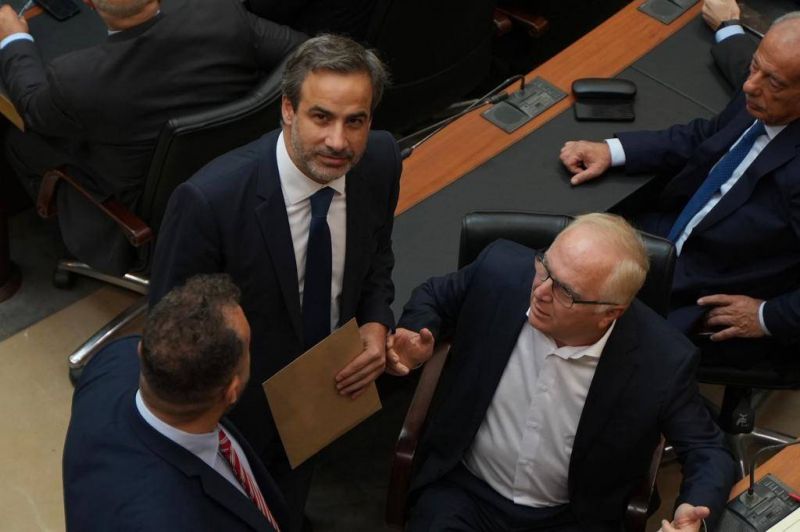
Member of Parliament Michel Moawad at Thursday's first presidential session. Although more than half the votes cast were blank votes, Moawad received 36 votes in his favor, primarily from MPs belonging to the Lebanese Forces, Kataeb, and other independents. (Credit: Mohammad Yassin/L'Orient Today)
Want to get the Morning Brief by email? Click here to sign up.
“Everybody knew no president would be elected,” Amal MP Ali Hassan Khalil said after yesterday’s Parliament session to elect a new president, during which more than half of the 122 MPs present cast blank votes. “The first session was an important step to unify the opposition, the majority of which elected me," MP Michel Moawad said after receiving 36 votes in his favor. Moawad had the endorsement of Lebanese Forces, Kataeb, and independent MPs, LF bloc leader Georges Adwan said. The 11 Forces of Change MPs present did not vote for Moawad, electing Murex co-founder Selim Eddé instead, who is also a shareholder of L'Orient-Le Jour. Ten additional protest votes were cast for “Lebanon.” One MP cast a vote for Mahsa Amini, and another for “the line of Rachid Karami,” a former prime minister who was assassinated in 1987. Parliament Speaker Nabih Berri said that he would schedule a new electoral session "when there is an agreement on a president." UN Special Coordinator for Lebanon Joanna Wronecka said that yesterday’s session “should serve as a step towards more concerted efforts” to elect a president. Article 75 of the Lebanese constitution – which states: “when Parliament convenes to elect a president, it constitutes an electoral college and not a deliberative assembly” – has cast doubts on Parliament’s ability to legislate or grant confidence to a government, if a new one is formed, before a new head of state is designated. President Michel Aoun’s term ends on Oct. 31.
Caretaker Interior Minister Bassam Mawlawi announced increased navy patrols, public awareness campaigns, preemptive security measures and stricter boat registration requirements as “necessary measures” in Lebanese authorities’ plan to curb irregular migration. Mawlawi did not clarify in his statement when enforcement of the new measures would begin. Irregular migration attempts sharply increased this year, after having doubled the year before, a UN source told L’Orient Today. The measures were announced following a cabinet meeting a week after the tragic deaths of more than 100 people, recovered on the Syrian Tartus shore after a failed sea migration attempt departing from Lebanon. Earlier yesterday, protesters called on Lebanese authorities to facilitate the repatriation of around 180 people currently detained on the shores of Turkey and Greece after departing from Lebanon.
Senior officers from the Lebanese Army “called on the United Nations to exert maximum pressure on the Israeli enemy in order to curb its hostile practices” during a routine meeting with Lebanese and Israeli army officers chaired by UNIFIL commander Major General Aroldo Lázaro, the Army said in a statement. “The Lebanese side addressed the daily and repeated Israeli attacks on Lebanese sovereignty by land, sea and air,” the statement added. Earlier the same day, an Israeli army spokesperson announced the arrest of two individuals who allegedly crossed the border from Lebanon. Lebanon and Israel are conducting indirect negotiations over maritime borders after an Israeli gas exploration deployment in June was contested by some Lebanese authorities. Tensions waxed and waned amid Hezbollah head Hassan Nasrallah’s threats to react militarily to perceived encroachments on Lebanese maritime resources and Israel’s ripostes. President Michel Aoun earlier this month announced that negotiations had entered their “final stages,” and on Monday said he is expecting a written US-mediated proposal “before the end of this week.”
The Federation of Syndicates of Bank Employees scheduled a protest for Oct. 12 in a statement calling on authorities to expedite the implementation of measures addressing the banking crisis, as well as “threats that are posted on social media to break into banks using weapons.” The countrywide bank employees union expressed concern for its members’ safety in the wake of a flurry of holdups this month during which depositors forcibly, sometimes at gunpoint, demanded to withdraw their own funds. Banks partially reopened on Monday, reinforcing security measures after closing last week to protest the “repeated attacks on the sector,” the Association of Banks in Lebanon said. The bank employees’ statement alleged Lebanese authorities “made the Lebanese lose their confidence in the banking sector” by failing to properly address the economic crisis, now in its third year. Bank employee syndicate president George al-Hajj said last week that authorities’ delay in making “crucial decisions” endangered bank employees’ lives. Depositors have had limited access to their funds under informal capital control measures imposed by banks, sparking outrage against the financial institutions.
In case you missed it, here’s our must-read story from yesterday: “New official exchange rate: Timing, challenges and implications.”
Compiled by Abbas Mahfouz